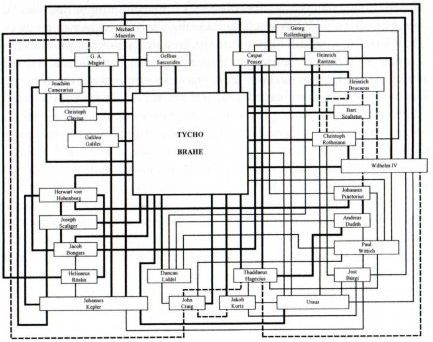I’ve just come back from 24 hours in Swansea, a town where, bizarrely, almost every road is one way (usually the opposite way to which you want to go). At the top of Mount Pleasant, students eke out their existence, one drunken stumble away from a 5-minute death-roll down Constitution Hill’s 45 degree gradient. Swansea is the kind of place where (ideally) you’d like a hang-glider to get to town, a satnav implant to get around, and a cable-car to get home again. But still, the beer’s good, so I can forgive all that… 😉
All of which springs to mind simply because I’ve just read a book on Tycho Brahe by Adam Mosley, history lecturer at the University of Swansea. From his office, most of the bright lights in the evening sky are doubtless not stars or planets, but roomlights in digs at the top of the hill, full of students massaging their aching quads and calves, & wondering why their 50cc scooter’s clutch burnt out in only two days.
In many ways, Mosley’s book – “Bearing The Heavens: Tycho Brahe and the Astronomical Community of the Late Sixteenth Century” (2007), Cambridge University Press, ISBN13: 9780521838665, £55.00, US$105.00 – dovetails quite neatly with “On Tycho’s Island”, as reviewed here recently: whereas the latter looks inwards at Brahe’s insular life on Hven, the former instead looks outwards to Brahe’s links with the external world. To do this, Mosley focuses on three things – Brahe’s letters, his books, and his instruments.
The writing is brisk and accessible throughout (though I felt devoting the first chapter to a justification of why he chose the punning title “Bearing the Heavens” was somewhat superfluous), and the two big chapters on books and instruments cover the ground well. But I have to say that this is all a bit of a feint, a distraction from Mosley’s actual thesis – which is concerned solely with the importance to the history of science of Brahe’s letters in their context. This is the real deal, the stuff that you can tell he’s excited about here.
And, I think, rightly so – Mosley’s book essentially sends out a ‘call to adventure’ to historians of Renaissance science, that they have woefully undervalued the usefulness of letters. Book publishing is just the tip of the iceberg of ideas – even these days, printing your own books is no walk in the park (trust me, I’ve tried it), and the difficulties involved 400-500 years ago were far greater, even for driven people of significant means such as Brahe. Renaissance letters were often copied and circulated, or even collated for later publication: and so Mosely argues that it is the huge interconnected web of letters that form the underwater bulk – and it is to this largely unseen mountain we should be devoting our attention.
Regular readers of this blog will know that this is a zeitgeisty angle (though perhaps still falling just short of being trendy), exemplified by (for example) Josef Smolka’s ongoing study of Tadeas Hajek’s letters to/from Andreas Dudith. What separates Mosley’s exposition is that he simply does not accept that it is a marginal area for study – for him, correspondence is king, and should occupy centre stage for our understanding of science pre-1600.
For a while, I’ve been thinking along these lines: I even tried creating a database in Freebase to try to map out & visualize the connections between various 16th century letter-writers, to try to glimpse the “invisible colleges” as they formed, flourished and faded. Yet when I saw Mosley’s Figure 2.1 on page 36 (which tries to do this for Brahe’s immediate network), I suddenly realised the staggering enormity of the challenge and gave up on the spot.

Ultimately, what historians of science would need is a gigantic collaborative correspondence database, that could be used as a cross-archive finding aid. Even though a few people’s letters have been studied in depth (such as Christopher Clavius, Tycho Brahe, Athanasius Kircher, etc), libraries and archives (particularly private archives) must still have an enormous collection of pearls of which historians are unaware.
Perhaps others have already advanced Mosley’s thesis just as eloquently and persuasively: but it is an idea whose time (I believe) has now come. Will others heed his call? I hope so…